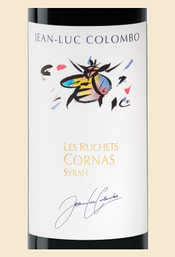Unlike many of the winemaking elites of the French wine industry, Jean-Luc Colombo was not born into the business. While growing up in the Mediterranean port city of Marseille, France, Colombo was surrounded by chefs, particularly his mother and grandmother. He envisioned a career in a professional kitchen.
"But my family said no, no, no," Colombo remembers with a chuckle and a smile. He was pushed instead to study pharmacy at the University of Montpelier. Colombo took his studies seriously and earned a degree, but his interest in a culinary career did not die. Jean-Luc also took classes in enology and developed a passion for wine.
"It was a natural transition from food to wine," he said.
Armed with a degree in pharmacy, Colombo and his wife set out in the early 1980s to establish a pharmacy, eventually landing in the village of Cornas in France’s northern Rhone Valley, albeit on the wrong side (or so many thought) of the Rhone River. The location was ideal, for Colombo was avidly pursuing a career as a consulting enologist at the same time, and the wines of Cornas were in need of repair.
He opened an enology lab in Cornas and the rest is history. In 1986, Colombo purchased his own vineyards and launched the winery that bears his name, becoming over a few short years "the most loved and the most hated" winemaker in the Rhone Valley, in his own words.
Colombo is now revered, but that was not always so. He arrived in the Rhone Valley with fresh ideas about viticulture and winemaking. His modern ideas clashed with the traditional methods, and there were some who thought Colombo would rob the Rhone of its regional character.
The reality, of course, is another story. The wines of the northern Rhone, particularly Cornas, were stuck in a time warp — rustic, requiring extended aging in the cellar, and often quite unpleasant in "off" vintages. Colombo promoted better practices in the vineyard, took advantage of the southeastern exposure of the steep slopes of Cornas (the southernmost AOC of the northern Rhone), and cleaned up the winemaking with modern techniques and new oak.
In short order, by producing elegant red wines (100 percent syrah by law) from land that had been overlooked or shunned in favor of the more glamorous AOC vineyards of Cote-Rotie and Hermitage, Colombo came to be the king of Cornas. I am reminded of this often when I visit the region, for other winemakers of Cornas are eager to impress by establishing the proximity of their vineyards to those of Jean-Luc Colombo.
Colombo is fond of crafting cuvees from separate areas of his vineyards, which he names. The most impressive to me is La Louvee (The She Wolf), made from 75-year-old vines. I have a number of bottles of this wine from the 2001 vintage in my cellar, and they remain youthful and powerful. The 2010, which I tasted recently, is cut from the same cloth, a powerful Cornas that will blossom over time.
His 2010 Les Ruchets (The Beehives) is another Cornas that fits the Jean-Luc Colombo profile — powerful and complex, packed with layers of blackcurrant and blueberry fruit but decidedly not overripe. Colombo is mindful of balance, walking the fine line between power and elegance.
It is for that reason his Chateauneuf-du-Pape (from purchased grapes) leans more heavily on syrah than grenache in the blend. "Grenache gives too much alcohol," he notes.
The early vintages of Jean-Luc Colombo wines were far from expensive, but his growing stature over the years has allowed him to command top dollar for La Louvee and Les Ruchets (about $85 per bottle retail). Other Jean-Luc Colombo wines, made with the same dedication to quality and specifically to be food-friendly, can be had for as little as $12.
The 2011 Les Abeilles (The Bees) Cote du Rhone rouge, a blend of grenache, syrah and mourvedre, is a tremendous value at $12.99, and the 2012 Cape Bleue Rose from Provence is delightful at $12.99.
Connect with Robert on Twitter at @WineGuru
